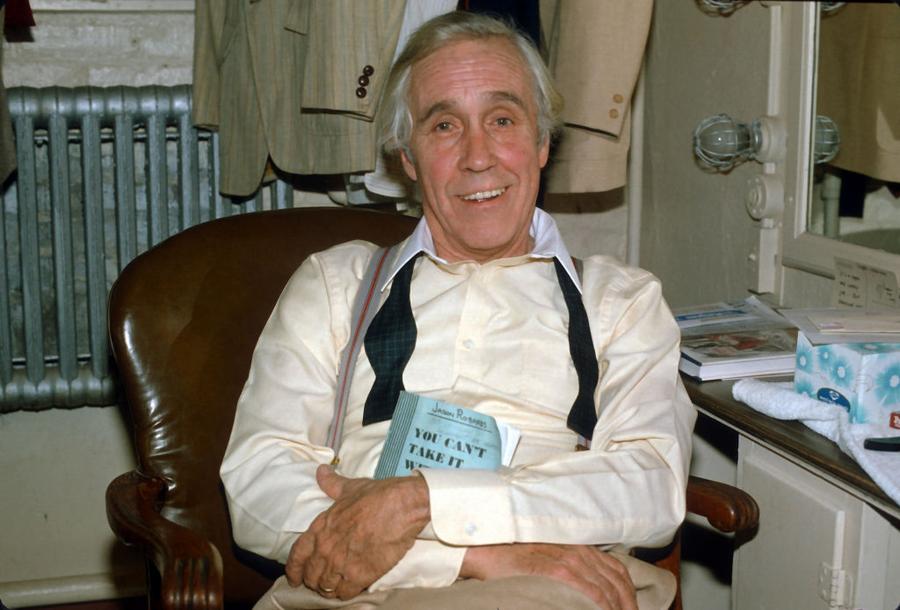[ad_1]
What was Jason Robards’s Net Worth?
Jason Robards was an American actor of the stage and screen who had a net worth of $10 million at the time of his death. Jason Robards rose to fame with his roles in such Broadway plays as “Long Day’s Journey into Night,” “The Disenchanted,” and “Toys in the Attic.” He went on to act in many films, and in the 1970s won consecutive Academy Awards for Best Supporting Actor for his performances in “All the President’s Men” and “Julia.” Robards also appeared frequently on television, with credits including the 1977 miniseries “Washington: Behind Closed Doors” and the 1988 television film “Inherit the Wind.”
Early Life and Education
Jason Robards Jr. was born on July 26, 1922, in Chicago, Illinois, to Hope and silent film actor Jason Sr. The family soon moved to New York City, and then to Los Angeles. Robards had a younger brother named Glenn before his parents divorced when he was in grade school. From his father’s second marriage, he had a half-sister named Laurel. Robards attended Hollywood High School, where he excelled in athletics. After his naval service, he studied at the American Academy of Dramatic Arts, graduating in 1948.
Naval Service
After graduating from high school in 1940, Robards enlisted in the US Navy. The next year, he was assigned to the heavy cruiser USS Northampton as a radioman. In late 1942, Robards survived the ship’s sinking by Japanese torpedoes. Two years later, he served as a radioman aboard the light cruiser USS Nashville, which was ultimately hit by a kamikaze aircraft. Robards survived once again and continued serving in the Navy until 1946.
Theater Career
In the early 1950s, Robards made his Broadway debut in the play “Stalag 17.” However, he had his career breakthrough later in the decade, starring in an off-Broadway revival of Eugene O’Neill’s “The Iceman Cometh” and in the original Broadway production of O’Neill’s “Long Day’s Journey into Night,” both in 1956. For his performance as Jamie Tyrone Jr. in the latter, Robards won the Theatre World Award and earned his first Tony Award nomination. He went on to win a Tony Award for his work in Budd Schulberg’s 1958 play “The Disenchanted.” Two years after that, Robards was nominated for his lead role in Lillian Hellman’s “Toys in the Attic.” He subsequently starred in “Big Fish, Little Fish” and the smash hit “A Thousand Clowns.” Over the remainder of the 1960s, Robards appeared in such plays as “After the Fall,” “But For Whom Charlie,” “Hughie,” “The Devils,” and “We Bombed in New Haven.”
In the first half of the 1970s, Robards acted in Broadway revivals of “The Country Girl” and “A Moon for the Misbegotten,” earning Tony Award nominations for both. Later in the decade, he was in O’Neill’s “A Touch of the Poet,” for which he received his eighth and final Tony Award nomination. In the 1980s, Robards appeared in the hit Broadway revival of “You Can’t Take it With You,” and reprised his past roles in revivals of “The Iceman Cometh” and “Long Day’s Journey into Night.” He also acted in a revival of O’Neill’s “Ah, Wilderness!” and appeared in “A Month of Sundays.” From 1989 to 1990, Robards starred in the original Broadway production of A. R. Gurney’s “Love Letters.” He followed that with roles in Israel Horovitz’s “Park Your Car in Harvard Yard” and Harold Pinter’s “No Man’s Land.” In 1996, Robards appeared in the US premiere of Brian Friel’s two-act play “Molly Sweeney.”

(Photo by Yvonne Hemsey/Getty Images)
Film Career
Robards had his first role on the big screen in the 1959 film “The Journey.” He went on to star in “By Love Possessed,” “Tender is the Night,” and “Long Day’s Journey into Night,” reprising his role from the play in the lattermost film. Robards reprised another of his stage roles, Murray Burns, in the 1965 film adaptation of “A Thousand Clowns.” His other credits in the ’60s included “Act One,” “Any Wednesday,” “The St. Valentine’s Day Massacre,” “Hour of the Gun,” “Once Upon a Time in the West,” and “The Night They Raided Minsky’s.” Kicking off the 1970s, Robards appeared in five films, including “The Ballad of Cable Hogue,” “Tora! Tora! Tora!,” and “Fools.” He was subsequently in such films as “Johnny Got His Gun,” “Murders in the Rue Morgue,” “The War Between Men and Women,” and “A Boy and His Dog.” In 1976, Robards portrayed Washington Post editor Ben Bradlee in the acclaimed political thriller “All the President’s Men,” about the investigation into the Watergate scandal. For his performance, he won the Academy Award for Best Supporting Actor. Robards won a second consecutive Academy Award the next year for his portrayal of writer Dashiell Hammett in the drama “Julia.” Closing out the decade, he starred in “Comes a Horseman” and “Hurricane.”
In 1980, Robards appeared in “Cabo Blanco,” “Raise the Titanic,” and “Melvin and Howard.” For his portrayal of Howard Hughes in the lattermost film, he earned an Academy Award nomination for Best Supporting Actor. Robards next portrayed Ulysses S. Grant in the 1981 film “The Legend of the Lone Ranger.” His credits over the rest of the decade included “Max Dugan Returns,” “Square Dance,” “Dream a Little Dream,” “Reunion,” “Parenthood,” and “Black Rainbow.” In his first film of the 1990s, Robards starred in the crime comedy “Quick Change.” That was followed by roles in “Storyville,” “The Adventures of Huck Finn,” and “Philadelphia.” In 1994, Robards appeared in “The Paper” and “Little Big League,” and in 1995 he had an uncredited part in the submarine thriller “Crimson Tide.” He went on to appear in “A Thousand Acres,” “The Real Macaw,” “Beloved,” and “Heartwood”; he also had an uncredited role as a congressman in “Enemy of the State.” Robards had his final film role in 1999, playing the cancer-stricken Earl Partridge in Paul Thomas Anderson’s acclaimed ensemble drama “Magnolia.”
Television Career
In the 1950s, Robards appeared on various anthology series, including “The Philco Television Playhouse,” “Armstrong Circle Theatre,” and “The Alcoa Hour.” The next decade, he starred as the titular president in the television film “Abe Lincoln in Illinois,” for which he received his first Emmy Award nomination. Robards starred in several more television films in the 1970s, including “The House Without a Christmas Tree,” “A Christmas to Remember,” and adaptations of two plays he was in, “The Country Girl” and “A Moon for the Misbegotten.” He also starred as fictional US president Richard Monckton in the 1977 miniseries “Washington: Behind Closed Doors.”
Robards began the 1980s playing real-life US president Franklin D. Roosevelt in the television film “F.D.R.: The Last Year.” The same year, he portrayed legendary talent agent Leland Hayward in the television film “Haywire.” Robards primarily appeared in TV movies throughout the decade, with credits including “The Day After,” “Sakharov,” “The Long Hot Summer,” “The Christmas Wife,” and “Inherit the Wind.” As Henry Drummond in “Inherit the Wind,” he won the Emmy Award for Outstanding Lead Actor in a Limited Series or Movie. Robards starred in a number of further television films in the 1990s, such as “The Perfect Tribute,” “Chernobyl: The Final Warning,” “My Antonia,” and “Journey.”
Personal Life and Death
Robards was married a total of four times, and had six children. He was wed to his first wife, Eleanor Pittman, from 1948 until their divorce in 1958. Robards was subsequent married to actress Rachel Taylor from 1959 until their divorce in 1961. He then wed another actress, Lauren Bacall; they divorced in 1969, in part due to Robards’s alcoholism. Sam and Lauren had one child, Sam Robards, who would also become an actor. His fourth and final wife was Lois O’Connor, whom he married in 1970. They remained together until Robards’s death.
In 1972, Robards was severely injured in a car accident after crashing his car into the side of a mountain in California. He survived, but his injuries required extensive surgery and facial reconstruction. Much later, on December 26, 2000, Robards passed away from lung cancer in Bridgeport, Connecticut. His body was interred at Oak Lawn Cemetery in Fairfield.
All net worths are calculated using data drawn from public sources. When provided, we also incorporate private tips and feedback received from the celebrities or their representatives. While we work diligently to ensure that our numbers are as accurate as possible, unless otherwise indicated they are only estimates. We welcome all corrections and feedback using the button below.
[ad_2]
Source link





